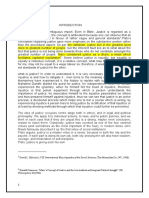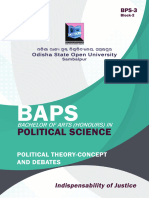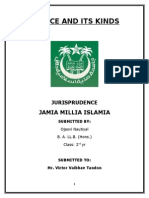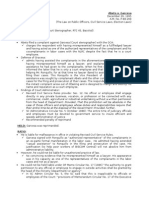Justice Justice Is The Concept Of: Benevolence
Justice Justice Is The Concept Of: Benevolence
Uploaded by
Sidra FahimCopyright:
Available Formats
Justice Justice Is The Concept Of: Benevolence
Justice Justice Is The Concept Of: Benevolence
Uploaded by
Sidra FahimOriginal Title
Copyright
Available Formats
Share this document
Did you find this document useful?
Is this content inappropriate?
Copyright:
Available Formats
Justice Justice Is The Concept Of: Benevolence
Justice Justice Is The Concept Of: Benevolence
Uploaded by
Sidra FahimCopyright:
Available Formats
Justice Justice is the concept of moral rightness based on ethics,rationality, law, natural law, religion, fairness, or equity, along
with the punishment of the breach of said ethics. According to most theories of justice, it is overwhelmingly important: John Rawls claims that "Justice is the first virtue of social institutions, as truth is of systems of thought." Justice can be thought of as distinct from and more fundamental than benevolence, charity, mercy, generosity or compassion. Justice has traditionally been associated with concepts of fate, reincarnation or Divine Providence, i.e. with a life in accordance with the cosmic plan. The association of justice with fairness has thus been historically and culturally rare and is perhaps chiefly a modern innovation [in western societies].[ Studies at UCLA in 2008 have indicated that reactions to fairness are "wired" into the brain and that, "Fairness is activating the same part of the brain that responds to food in rats... This is consistent with the notion that being treated fairly satisfies a basic need".Research conducted in 2003 at Emory University, Georgia, USA, involving Capuchin Monkeys demonstrated that other cooperative animals also possess such a sense and that "inequity aversion may not be uniquely human."indicating that ideas of fairness and justice may be instinctual in nature. Understandings of justice differ in each culture, as cultures are dependent on a shared history and mythology and/or religion. Each culture's ethics create values which influence the notion of justice. Although there can be found some justice principles that are one and the same in all or most of the cultures, these are insufficient to create a unitary justice apprehension. Justice is a proper,harmonious relationship between the warring parts of the person or city. Hence Plato's definition of justice is that justice is the having and doing of what is one's own. A just man is a man in just the right place, doing his best and giving the precise equivalent of what he has received. This applies both at the individual level and at the universal level. A person's soul has three parts reason, spirit and desire. Similarly, a city has three parts Socrates uses the parable of the chariot to illustrate his point: a chariot works as a whole because the two horses power is directed by the charioteer. Lovers of wisdom philosophers, in one sense of the term should rule because only they understand what is good. If one is ill, one goes to a doctor rather than a psychologist, because the doctor is expert in the subject of health. Similarly, one should trust one's city to an expert in the subject of the good, not to a mere politician who tries to gain power by giving people what they want, rather than what's good for them. Socrates uses the parable of the ship to illustrate this point: the unjust city is like a ship in open ocean, crewed by a powerful but drunken captain (the common people), a group of untrustworthy advisors who try to manipulate the captain into giving them power over the ship's course (the politicians), and
anavigator (the philosopher) who is the only one who knows how to get the ship to port. For Socrates, the only way the ship will reach its destination the good is if the navigator takes charge. In contrast to the understandings canvassed so far, justice may be understood as a humancreation, rather than a discovery of harmony, divine command, or natural law. This claim can be understood in a number of ways, with the fundamental division being between those who argue that justice is the creation of some humans, and those who argue that it is the creation of all humans. According to thinkers in the social contract tradition, justice is derived from the mutual agreement of everyone concerned; or, in many versions, from what they would agree to under hypotheticalconditions including equality and absence of bias. This account is considered further below, under Justice as fairness. According to utilitarian thinkers including John Stuart Mill, justice is not as fundamental as we often think. Rather, it is derived from the more basic standard of rightness, consequentialism: what is right is what has the best consequences (usually measured by the total or average welfare caused). So, the proper principles of justice are those that tend to have the best consequences. These rules may turn out to be familiar ones such as keeping contracts; but equally, they may not, depending on the facts about real consequences. Either way, what is important is those consequences, and justice is important, if at all, only as derived from that fundamental standard. Mill tries to explain our mistaken belief that justice is overwhelmingly important by arguing that it derives from two natural human tendencies: our desire to retaliate against those who hurt us, and our ability to put ourselves imaginatively in another's place. So, when we see someone harmed, we project ourselves into her situation and feel a desire to retaliate on her behalf. If this process is the source of our feelings about justice, that ought to undermine our confidence in them
Fairness
A Theory of Justice, John Rawls used asocial contract argument to show that justice, and especially distributive justice, is a form of fairness: an impartial distribution of goods. Rawls asks us to imagine ourselves behind a veil of ignorance that denies us all knowledge of our personalities, social statuses, moral characters, wealth, talents and life plans, and then asks what theory of justice we would choose to govern our society when the veil is lifted, if we wanted to do the best that we could for ourselves. We dont know who in particular we are, and therefore cant bias the decision in our own favour. So, the decision-in-ignorance models fairness, because it excludes selfish bias. Rawls argues that each of us would reject the utilitariantheory of justice that
we should maximize welfare (see below) because of the risk that we might turn out to be someone whose own good is sacrificed for greater benefits for others. Instead, we would endorse Rawls's two principles of justice: Each person is to have an equal right to the most extensive total system of equal basic
liberties compatible with a similar system of liberty for all. Social and economic inequalities are to be arranged so that they are both to the greatest benefit of the least advantaged, consistent with the just savings
principle, and attached to offices and positions open to all under conditions of fair equality of
opportunity.[11] This imagined choice justifies these principles as the principles of justice for us, because we would agree to them in a fair decision procedure. Rawls's theory distinguishes two kinds of goods (1)liberties and (2) social and economic goods, i.e. wealth, income and power and applies different distributions to them equality between citizens for (1), equality unless inequality improves the position of the worst off for KEY ELEMENTS OF A PEACEFUL SOCIETY Social justice generally refers to the idea of creating a society or institution that is based on the principles of equality and solidarity, that understands and values human rights, and that recognizes the dignity of every human being.[1][2] The term and modern concept of "social justice" was coined by the Jesuit Luigi Taparelli in 1840 based on the teachings of St. Thomas Aquinas and given further exposure in 1848 by Antonio Rosmini-Serbati.[1][2][3][4][5] The idea was elaborated by the moral theologian John A. Ryan, who initiated the concept of a living wage. Father Coughlin also used the term in his publications in the 1930s and the 1940s. It is a part of Catholic social teaching, Social Gospel from Episcopalians and is one of the Four Pillars of the Green Party upheld by green parties worldwide. Social justice as a secular concept, distinct from religious teachings, emerged mainly in the late twentieth century, influenced primarily by philosopher John Rawls. Some tenets of social justice have been adopted by those on the left of the political spectrum. Social justice is based on the concepts of human rights and equality and involves a greater degree ofeconomic egalitarianism through progressive taxation, income redistribution, or even property redistribution. These policies aim to achieve what developmental economists refer to as more equality of opportunity than may currently exist in some societies, and to manufacture equality of outcome in cases where incidental inequalities appear in a procedurally
just system. The Constitution of theInternational Labour Organization affirms that "universal and lasting peace can be established only if it is based upon social justice."[6] And the Vienna Declaration and Programme of Action treats social justice as a purpose of the human rights education.
What drawbacks in justice systen of Pakistan?
The major problem with the Justice system in Pakistan is that there is little justice. Corruption and bribery exist on such extreme and wide spread levels. If you need something done, it's much easier to pay your way out of it. For example, suppose you get a traffic ticket of some sort. The police will take the offender's driving license, issue a ticket, and instruct the offender to go to xyz location to pay the ticket and get the license back. The problem is that when the offender goes to pay the ticket there would be forms and such an archaic way of handling the small issue that it is just much easier to pay the police money (that he personally keeps) and not get a ticket in the first place. You can subtitute any problem in place of the police example, and this is how much chaos you have to deal with all of the time. Systems are improving, but even still, it will take quite a while for the mentality of bribery and corruption to change. No one takes laws seriously from those laws that do exist. If we go into more important issues such as crime, we'll see exactly what the issue is on a very large scale. Take this issue. When I lived in Pakistan with my inlaws we had a servant who's mother in law came from their village terribly beat up from her husband. We asked her to press charges, but she refused stating that it'd be useless. Her husband will merely pay the judge/officers off and likely charge her for false accusations. So people feel no sense of justice because there is no justice. People don't feel the need to take matters into their own hands in the U.S. simply because our justice system is much more solid. We can't bribe the police and judges so easily. Maybe higher ups do encounter corruption on some level. What government doesn't? However, the common folk feel safe, protected, and as though justice will be served in a fair way, overall. Sure mishaps happen, but overall the system is better in how its carried out consistently. The public's perception of justice is really the key as well which sort of voids incidents of injustice that happen here and there.
The Taliban takeover of Swat last year was explained by many commentators as a result of state failure in the provision of justice. Indeed, the agreement reached between the militants and the government was called the Nizam-e-Adl (System of Justice) Regulation. The unfortunate fact is, however, that the same vacuum of justice exists in every corner of Pakistan today. This is not to imply that state authority and control can be challenged everywhere: the Pakistani government is large and powerful. However, its reach is limited in rural areas, and its importance subservient to individual power relations. Everywhere from the streets of the capital city, to the most remote village in Baluchistan, legal rules mean far less than a call to a powerful police officer, politician, or, trumping it all, the regional Army Corp Commander, and has been so throughout my lifetime. In the ultimate irony then, lawlessness and the state coexist across Pakistan. This cedes moral and political ground to local thugs who reshape themselves as guardians of people's rights and values. In Baluchistan, Bramdagh Bugti openly encourages terrorism including targeted killings of Punjabis, on the grounds that the Baloch have long been treated unfairly. The Baloch uprising, gestated by a kleptomaniacal central government system and a history of taking from the poor and giving to the rich, is fast being adopted by the mainstream Baloch due to the lack of efforts by the center to develop our poorest
province. Our historical failure to provide justice to these areas is evident from the labels given to the reconciliation packages adopted. Swat had its Nizam-e-Adl. Balochistan is being offered an Aghaz-e-Huqooq-i-Baluchistan (literally, the Genesis of Rights of Balochistan). These regional packages are merely plugging holes in a sieve. Phone-snatchings and robberies in major cities isn't news anymore, but are in fact expected. Even murdering an individual who does not enjoy connections with the powerful is trivial, and has been so for some time. Individual organizations, often connected to some militant interpretation of Islam, dictate terms to the government in Karachi, or openly challenge the government's writ in Islamabad. The infuriating thing is, politicians, the army high command, and self-proclaimed 'defense analysts' alike remain transfixed by foreign explanations. In the case of politicians and bureaucrats, this can be understood as an attempt to shift attention away from their own past failures. What puzzles me to no end is why the public buys into this charade of an explanation while ignoring the evidence of state failure and corruption that we are slapped with in our daily lives. How hard is it to connect the dots? Countries have rivalries and hostilities, and it may well be (in fact, it is in my estimation likely) that others are contributing to our problems. However, their importance cannot be overestimated. Pakistan's future will be determined by the Pakistani public and the Pakistani state. We cannot let our perceptual gestalt, our overarching explanation, be allotting blame to others. To my mind, there are a handful of necessary preconditions to halting our slide. They may be fantastic and impractical, but without addressing them, we cannot hope to recover: Reconstituting the provinces, and delineating their rights with respect to the center: Our provinces as they exist today are ridiculously large by international standards, and divided along ethnic lines. Dividing them into, say, 12-15 provinces would help us parse our problems and focus on them better. It might also reduce provincial tensions bolstered by ethnic differences. A limited federation would organize and fund activities that represent or serve all provinces, like international affairs, the army, and the maintenance of a fund to fund pro-poor activities in economically backward regions. The provision of justice, past, present and future: This is so simple to write about, and so challenging in reality, but it must be done. Peace follows justice. The failure to resolve decades-old cases does not remove the damage they do to the fabric of society, and as best as possible, they must be addressed, perhaps by setting up special courts to clear the backlog. The whole judicial system, in fact, would need redress. Land reforms: Too few people own too much land in Pakistan. There is nothing wrong with wealth itself, but an agency that investigates large land holdings for legal propriety, and the privatization of excessive public land holding, not by sale to the highest bidder, but to the most needy, is needed to have hope for future stability. Moreover, the state cannot relinquish its theoretical monopoly of violence to the local landlord.
Peace with India: With an army less than a sixth of our alleged 'rival's', and an overextended economy, we simply cannot afford aggression towards India. Maintaining a viable defense force, and strictly a defensive force is the only way forward. We should be hoping to compete, not in how many guns we can point at them, but how educated and wellfed our people are compared to our neighbors. Politician Accountability: This means following up on the work NAB started early during the Musharraf era (which he claimed in his book was too politically difficult for him to continue), punishing those found guilty, etc. It is also unacceptable for politicians to keep their wealth, residences, and children abroad. If our leaders don't signal confidence in Pakistan, and if they have a comfortable exit option, how can we expect them to be fully committed to the country?
suggestions
Some criminals and negative minded people do not like my articles. Here I want to explain very clearly that these articles are written with constructive and positive intensions. Articles are based on solid facts and personal experience. Mostly articles are aimed to social and economic welfare, crime prevention, law and justice improvement, anti-terrorism, tolerance and many important suggestions about all aspects of life including political, social and economic reforms. Many of my rights and issues are acknowledged, endorsed and recommended by many high offices, dignitaries and platforms. Often it is said that issues seldom resolve in Pakistan. In civilized societies, Issues must be resolved in a peaceful manner. It is true that government and authorities rarely realize their obligations. These issues are online over internet for last four years. It is a open test case for all authorities. People around the world are witness of these issues. I presented these issues in the most peaceful and legal manner.
wiki.answers.com Wiki Answers Categories Law & Legal Issues www.islamicinsights.com/.../lawlessness-and-the-fundamental-decline-of-pakistan.html
http://www.pakistannewsarticles.co.cc/pakistan_news_articles.htm
en.wikipedia.org/wiki/Justice www.yespakistan.com/security/
You might also like
- Theories of JusticeDocument4 pagesTheories of JusticeMohandas Periyasamy100% (1)
- Distributive and Corrective Justice in Indian Perspective.Document5 pagesDistributive and Corrective Justice in Indian Perspective.Sneha MajumderNo ratings yet
- World Class BullDocument4 pagesWorld Class BulltanzeelaNo ratings yet
- Maturan v. COMELECDocument2 pagesMaturan v. COMELECJates Oineza100% (1)
- Justice Is A Concept Of: o o o o o o o o o oDocument10 pagesJustice Is A Concept Of: o o o o o o o o o oInamullah KhanNo ratings yet
- Rawls Theory of JusticeDocument6 pagesRawls Theory of JusticeGEOFFREY KAMBUNINo ratings yet
- Moral TheoriesDocument10 pagesMoral Theoriesalmighty.thor786No ratings yet
- Theory of Justice-JrDocument9 pagesTheory of Justice-JrvincemsrNo ratings yet
- SOCIAL JUSTICE DAY 2016 SHORT Copy (1Document25 pagesSOCIAL JUSTICE DAY 2016 SHORT Copy (1Melissa KhevarliNo ratings yet
- Rawls JusticeDocument21 pagesRawls Justicecaryljoyce.macedaNo ratings yet
- Theories of JusticeDocument13 pagesTheories of Justicejeff mutindaNo ratings yet
- Polsci Assignment Sem-2Document19 pagesPolsci Assignment Sem-2TanishaNo ratings yet
- Amartya Sen's Views On JusticeDocument11 pagesAmartya Sen's Views On JusticeVinay YadavNo ratings yet
- Rawls' Theory of JusticeDocument9 pagesRawls' Theory of JusticelaisbovetoNo ratings yet
- Jurisprudence: Social JusticeDocument6 pagesJurisprudence: Social JusticeMR. ISHU POLASNo ratings yet
- Proper Sense. Justice in The Oldest Sense Was Explained As Contained in The Ancient EgyptianDocument4 pagesProper Sense. Justice in The Oldest Sense Was Explained As Contained in The Ancient EgyptianJoey jnr CudjoeNo ratings yet
- Theories of JusticeDocument10 pagesTheories of Justiceonganya100% (1)
- Justice - WikipediaDocument14 pagesJustice - WikipediaGWYNETH RICHELLE LIMNo ratings yet
- John RawlsDocument8 pagesJohn RawlsKik EtcNo ratings yet
- Baps 03 Block 02Document35 pagesBaps 03 Block 02suman kalyan DashNo ratings yet
- Module 4 - JurisprudenceDocument14 pagesModule 4 - JurisprudenceBhavapriya SreenivasNo ratings yet
- John Rawls' Theory of JusticeDocument6 pagesJohn Rawls' Theory of JusticeMandira PriyaNo ratings yet
- SS 17 Paper V Half 1 Topic 4bDocument7 pagesSS 17 Paper V Half 1 Topic 4bOladipupo MuhammedNo ratings yet
- Ethics 101Document20 pagesEthics 101Jacky Afundar BandalNo ratings yet
- Rawls Theory of Justice and Its Manifestation in Indian ConstitutionDocument18 pagesRawls Theory of Justice and Its Manifestation in Indian ConstitutionAnamNo ratings yet
- A Theory of JusticeDocument4 pagesA Theory of JusticeMaria SaishaNo ratings yet
- H.P National Law University, Shimla: Assignment of "Legal Methodology" Topic: Dimension of Justice: An OverviewDocument12 pagesH.P National Law University, Shimla: Assignment of "Legal Methodology" Topic: Dimension of Justice: An OverviewKushagra SrivastavaNo ratings yet
- John Rawls Theory of JusticeDocument5 pagesJohn Rawls Theory of JusticeKritika RastogiNo ratings yet
- Concept of JusticeDocument6 pagesConcept of Justicemagicalbrain1No ratings yet
- WP 1Document4 pagesWP 1api-384228503No ratings yet
- Ethics Module 6 - GlobalizationDocument21 pagesEthics Module 6 - GlobalizationJoshua Mhel SamaniegoNo ratings yet
- Unit 6 Justice: StructureDocument122 pagesUnit 6 Justice: StructureJanette AlmeidaNo ratings yet
- Ethics Narrative and ReflectionDocument2 pagesEthics Narrative and ReflectionBrndn Dl CrzNo ratings yet
- Philo 3 4Document24 pagesPhilo 3 4deukae teudongiNo ratings yet
- Theory of Justice LLM Chapter OneDocument28 pagesTheory of Justice LLM Chapter OneUmaar MaqboolNo ratings yet
- 07 - Chapter 1Document20 pages07 - Chapter 1Ankit YadavNo ratings yet
- p11 DhawalDocument10 pagesp11 DhawalBea Czarina NavarroNo ratings yet
- Polsci Sem2Document14 pagesPolsci Sem2niyati1171No ratings yet
- John RawlsDocument10 pagesJohn RawlsBiswamitra RanaNo ratings yet
- Approaches To EthicsDocument9 pagesApproaches To EthicsSserwadda Abdul RahmanNo ratings yet
- Chapter 1Document48 pagesChapter 1Aryan AnsariNo ratings yet
- Aristotle and Plato On JusticeDocument2 pagesAristotle and Plato On JusticeSuyash RaoNo ratings yet
- JusticeDocument4 pagesJusticeHakim AfzalNo ratings yet
- Unit 4 - Theory of JusticeDocument19 pagesUnit 4 - Theory of JusticeVedant AroraNo ratings yet
- Law, Justice and GlobalisationDocument18 pagesLaw, Justice and GlobalisationSRINIVASA RAO KARRANo ratings yet
- Lecture 9 John Rawl - S Theory of JusticeDocument16 pagesLecture 9 John Rawl - S Theory of Justiceveercasanova100% (3)
- Justice and Its KindDocument33 pagesJustice and Its KindGabriela StevensNo ratings yet
- UntitledDocument3 pagesUntitledOmaury AlvarezNo ratings yet
- Jurisprudence: Social JusticeDocument5 pagesJurisprudence: Social JusticeMR. ISHU POLASNo ratings yet
- Theory of Justice - 1Document14 pagesTheory of Justice - 1John Leo R. Española,100% (1)
- Unit 5 JurisDocument6 pagesUnit 5 JurisMukul KumarNo ratings yet
- 1 - Hilbay - Review of The Idea of Justice - Final PDFDocument12 pages1 - Hilbay - Review of The Idea of Justice - Final PDFEmmanuel S. Caliwan100% (1)
- Distributive Justice in RawlsDocument9 pagesDistributive Justice in RawlsPETERESCRIVANo ratings yet
- The Concept of Justice: ChapterDocument41 pagesThe Concept of Justice: Chapterزهرة الزنبق زهرة الزنبقNo ratings yet
- John Rawls: Justice As Fairness A. Nature of The TheoryDocument7 pagesJohn Rawls: Justice As Fairness A. Nature of The TheoryPanJan BalNo ratings yet
- Social Justice-1Document24 pagesSocial Justice-1Aditya KumarNo ratings yet
- John Rawls Theory of JusticeDocument13 pagesJohn Rawls Theory of Justicesinglalovish2002No ratings yet
- JusticeDocument6 pagesJusticemkreddy6989No ratings yet
- Group 6 Presentation in EthicsDocument30 pagesGroup 6 Presentation in EthicsAKARYSNo ratings yet
- Moving Beyond Good and Evil: A Theory of Morality, Law, and GovernmentFrom EverandMoving Beyond Good and Evil: A Theory of Morality, Law, and GovernmentNo ratings yet
- To End a War: A Short History of Human Rights, the Rule of Law, and How Drug Prohibition Violates the Bill of RightsFrom EverandTo End a War: A Short History of Human Rights, the Rule of Law, and How Drug Prohibition Violates the Bill of RightsNo ratings yet
- Ethical and Social Aspects of MarketingDocument24 pagesEthical and Social Aspects of MarketingVasudha AvinashNo ratings yet
- Consolidated Case Digest - Police PowerDocument7 pagesConsolidated Case Digest - Police PowerAronJamesNo ratings yet
- Ameziel Inc. v. Wiesner Prods. - Answer & CounterclaimsDocument14 pagesAmeziel Inc. v. Wiesner Prods. - Answer & CounterclaimsSarah BursteinNo ratings yet
- Amended Constitution MKUSA 22 June 2018Document61 pagesAmended Constitution MKUSA 22 June 2018Rahim NyeiteNo ratings yet
- Tax 6 DigestsDocument10 pagesTax 6 DigestsAnonymous XsaqDYDNo ratings yet
- Foreign Contribution Regulation ActDocument27 pagesForeign Contribution Regulation ActLalitha Govindan0% (1)
- Roadshow 09 01 2018 PDFDocument76 pagesRoadshow 09 01 2018 PDFMark VernonNo ratings yet
- Intengan Vs CA 128996 February 15, 2002 J. de Leon, JR Second DivisionDocument10 pagesIntengan Vs CA 128996 February 15, 2002 J. de Leon, JR Second DivisionjonbelzaNo ratings yet
- Maria Virginia V. Remo, vs. The Honorable Secretary of Foreign Affairs, Respondent. G.R. No. 169202, March 05, 2010Document2 pagesMaria Virginia V. Remo, vs. The Honorable Secretary of Foreign Affairs, Respondent. G.R. No. 169202, March 05, 2010Edgar Joshua Timbang100% (1)
- Bradford United Church of Christ v. Dante AndoDocument20 pagesBradford United Church of Christ v. Dante AndoTrisha Kong DeiparineNo ratings yet
- 08 People v. SolaDocument3 pages08 People v. SolaAngelie Maningas100% (1)
- Abeto v. Garcesa Case DigestDocument2 pagesAbeto v. Garcesa Case DigestCari Mangalindan MacaalayNo ratings yet
- Abueva FederalismDocument4 pagesAbueva FederalismDesiree Tejano-OquiñoNo ratings yet
- Petitioner, vs. PEOPLE OF: Uypitching v. Quiamco G.R. No. 146322Document4 pagesPetitioner, vs. PEOPLE OF: Uypitching v. Quiamco G.R. No. 146322Alicia Jane NavarroNo ratings yet
- Don Carlos Polytechnic College: Criminology DepartmentDocument23 pagesDon Carlos Polytechnic College: Criminology DepartmentMaegretchen AdorableNo ratings yet
- Fuentebella vs. CastroDocument1 pageFuentebella vs. CastroLolit CarlosNo ratings yet
- People Vs EchavesDocument1 pagePeople Vs EchavesEarvin Joseph BaraceNo ratings yet
- Courts: Three Tier System Under Consumer Act: Consumer Disputes Redressal AgenciesDocument2 pagesCourts: Three Tier System Under Consumer Act: Consumer Disputes Redressal Agenciesronitr209No ratings yet
- Health Law - Privacy ConfidentialityDocument19 pagesHealth Law - Privacy ConfidentialityTony NgNo ratings yet
- 31.people vs. YatarDocument18 pages31.people vs. Yatarvince005No ratings yet
- United States v. Homero Armendariz-Tamez, 4th Cir. (2013)Document5 pagesUnited States v. Homero Armendariz-Tamez, 4th Cir. (2013)Scribd Government DocsNo ratings yet
- Orianne Collins and Thomas Bates Response To Phil Collins ComplaintDocument25 pagesOrianne Collins and Thomas Bates Response To Phil Collins ComplaintPeterBurkeNo ratings yet
- 12112020internal Memo - Main Academic Calendar 2021 AcMDDocument1 page12112020internal Memo - Main Academic Calendar 2021 AcMDmohd HazzahNo ratings yet
- Liabilities of LawyersDocument2 pagesLiabilities of LawyersCarlo Alexir Lorica LolaNo ratings yet
- 25-Abrams v. US 250 US 616 November 10, 1919Document9 pages25-Abrams v. US 250 US 616 November 10, 1919Jopan SJNo ratings yet
- Mumabi Memorila RespondentDocument24 pagesMumabi Memorila Respondentpranav100% (1)
- Accountability of Public OfficersDocument5 pagesAccountability of Public OfficersJazib ZainabNo ratings yet
- Ce Laws NotesDocument2 pagesCe Laws NotesasdasasdsdfsdfNo ratings yet

























































































